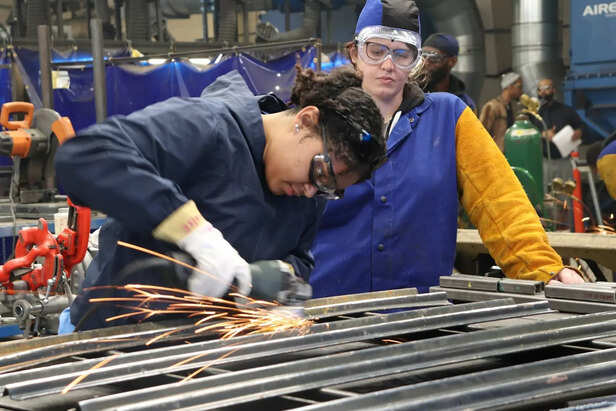Top 10 Jobs That May Disappear by 2030
Pranav P | Tue, 20 May 2025
By 2030, many jobs, such as cashiers, telemarketers, and travel agents, may disappear due to automation and AI. While this shift can be unsettling, it also opens up new opportunities in fields like healthcare and technology. To stay relevant, workers will need to adapt by acquiring new skills and embracing the changes in the workforce.
( Image credit : Unsplash )
Photo:
The future of work is being reshaped before our eyes. Technology, particularly artificial intelligence and automation, is transforming how businesses operate, how services are delivered, and ultimately, how people work. This disruption is not necessarily new—think about the elevator operators of the early 1900s or the video rental clerks of the '90s—but the pace today is faster than ever.
By 2030, many of today’s familiar jobs may either disappear entirely or evolve beyond recognition. This doesn’t mean fewer people will work, but it does mean the types of jobs available will change drastically. If you’re preparing for the future or simply curious about which roles are fading, here are ten jobs that are most at risk of disappearing by the end of the decade.

The role of the cashier is being automated out of existence. In grocery stores, pharmacies, and fast-food restaurants, self-checkout machines and digital kiosks have become commonplace. Retailers like Walmart and Target are investing heavily in these systems, allowing shoppers to scan and pay without human assistance.
Then there’s Amazon Go—stores that use sensors and cameras to track what customers take off shelves and charge them automatically as they walk out. This type of "checkout-free" shopping is gaining ground fast. With the push for speed, efficiency, and cost-cutting, it’s clear that the traditional cashier position is on borrowed time.
Telemarketing is a tough sell—literally. With most people hanging up on sales calls, blocking unknown numbers, or using spam call filters, this job has already been in decline. Now, automation and AI are taking it the rest of the way.
Companies are using AI-powered chatbots and voice assistants that can make sales pitches, answer questions, and collect data more efficiently than human agents. These bots work 24/7, don’t need breaks, and never lose their temper. As AI gets better at natural language processing, the need for human telemarketers will likely vanish.

Data entry used to be a staple job in offices around the world. Now, it’s one of the most vulnerable to automation. Software can process, extract, and input information faster and with fewer errors than a human can.
Optical character recognition (OCR) and AI-based document processing tools are replacing manual data entry tasks in industries like healthcare, finance, and logistics. As companies digitize records and integrate smarter systems, the role of the data entry clerk is quickly fading into history.
Once upon a time, booking a vacation meant sitting down with a travel agent. Today, most people go online, compare prices, check reviews, and book flights and hotels themselves—often in minutes.
With the rise of platforms like Expedia, Booking.com, and Airbnb, as well as apps that plan entire trips, traditional travel agents are becoming unnecessary. Some still exist to serve luxury travelers or specialized markets, but the job as a mainstream career is disappearing fast.
The banking industry is undergoing a digital revolution. Online banking, mobile apps, and ATMs have already reduced foot traffic in bank branches. Now, AI-powered financial assistants and remote banking options are accelerating the decline of the teller role.
Banks are closing physical branches and replacing in-person services with apps that can do everything from transferring money to applying for a loan. While some bank tellers may remain for specialized or high-touch services, the majority of these positions may no longer be needed within the next five years.

Postal services worldwide are dealing with a sharp decline in letter mail as people switch to email, messaging apps, and digital communication. Though package delivery is still strong thanks to e-commerce, private companies like Amazon and FedEx are moving toward drone deliveries and autonomous vehicles.
In some cities, robots are already delivering mail. With fewer letters to deliver and smarter logistics taking over, postal workers may soon become a rare sight, especially in urban areas where automation can scale quickly.
The shift from print to digital media is nothing new, but the impact on journalism continues to grow. Newspapers are closing at an alarming rate, and more people are consuming news through social media, YouTube, and podcasts.
AI is also entering the newsroom. Tools like ChatGPT and other content generators can produce summaries, write financial reports, and even craft news articles. While investigative journalism and editorial work will still require a human touch, basic reporting may become increasingly automated.
In the age of ride-sharing apps like Uber, Lyft, and Ola, the traditional role of a taxi dispatcher has already shrunk dramatically. These platforms use GPS and algorithms to connect drivers and passengers instantly, making manual dispatch obsolete.
And with self-driving taxis already in testing in cities like San Francisco, the entire concept of a human dispatch system may soon be irrelevant. The combination of app-based platforms and autonomous vehicles could make this job virtually extinct by 2030.

Manufacturing has long been a target for automation, but modern robotics is taking things to the next level. Today’s robots are faster, more precise, and capable of handling complex tasks that used to require human coordination.
From automotive factories to electronics plants, assembly lines are increasingly staffed by machines. While humans still monitor and maintain these systems, the number of workers needed on the actual production floor is decreasing steadily. By 2030, many traditional assembly line roles may no longer exist.
In fast food restaurants, speed and consistency are everything—and that’s where automation excels. Companies like McDonald’s and White Castle are already experimenting with burger-flipping robots, automated fryers, and even robotic baristas.
These machines don’t just save on labor—they also reduce food waste, increase hygiene, and work 24/7. As the technology becomes cheaper, it’s likely that more fast-food chains will replace kitchen staff with machines, leaving fewer entry-level opportunities in the food industry.
It’s easy to look at this list and feel discouraged, especially if your job is on it. But history shows that technological change, while disruptive, also creates new kinds of work. During the industrial revolution, many manual jobs disappeared—but new roles in engineering, logistics, and machine maintenance were born.
The key is adaptation. Workers who stay flexible, keep learning, and build skills in areas like tech, creativity, and problem-solving will have more opportunities in the new economy.

While some roles are vanishing, others are booming. Careers in healthcare, cybersecurity, software development, renewable energy, and elder care are expected to grow dramatically. Human skills—like emotional intelligence, critical thinking, and adaptability—will continue to be valuable, especially in jobs that can’t be easily automated.
The job landscape of 2030 will look very different from today’s. Many of the roles we take for granted are likely to fade away, not because work is disappearing, but because the nature of work is evolving. Rather than fear the future, the best strategy is to prepare for it. By staying informed, building future-ready skills, and embracing change, we can all find our place in the economy of tomorrow. Whether you’re just starting out in your career or thinking about a transition, now is the time to future-proof your skills and stay ahead of the curve.
unlock insightful tips and inspiration on personal growth, productivity, and well-being. Stay motivated and updated with the latest at My Life XP.
By 2030, many of today’s familiar jobs may either disappear entirely or evolve beyond recognition. This doesn’t mean fewer people will work, but it does mean the types of jobs available will change drastically. If you’re preparing for the future or simply curious about which roles are fading, here are ten jobs that are most at risk of disappearing by the end of the decade.
1. Cashiers

jobs that will be taken over 2030
( Image credit : Unsplash )
The role of the cashier is being automated out of existence. In grocery stores, pharmacies, and fast-food restaurants, self-checkout machines and digital kiosks have become commonplace. Retailers like Walmart and Target are investing heavily in these systems, allowing shoppers to scan and pay without human assistance.
Then there’s Amazon Go—stores that use sensors and cameras to track what customers take off shelves and charge them automatically as they walk out. This type of "checkout-free" shopping is gaining ground fast. With the push for speed, efficiency, and cost-cutting, it’s clear that the traditional cashier position is on borrowed time.
2. Telemarketers
Companies are using AI-powered chatbots and voice assistants that can make sales pitches, answer questions, and collect data more efficiently than human agents. These bots work 24/7, don’t need breaks, and never lose their temper. As AI gets better at natural language processing, the need for human telemarketers will likely vanish.
3. Data Entry Clerks

jobs that will be gone soon by 2030-unsplash
( Image credit : Unsplash )
Data entry used to be a staple job in offices around the world. Now, it’s one of the most vulnerable to automation. Software can process, extract, and input information faster and with fewer errors than a human can.
Optical character recognition (OCR) and AI-based document processing tools are replacing manual data entry tasks in industries like healthcare, finance, and logistics. As companies digitize records and integrate smarter systems, the role of the data entry clerk is quickly fading into history.
4. Travel Agents
With the rise of platforms like Expedia, Booking.com, and Airbnb, as well as apps that plan entire trips, traditional travel agents are becoming unnecessary. Some still exist to serve luxury travelers or specialized markets, but the job as a mainstream career is disappearing fast.
5. Bank Tellers
Banks are closing physical branches and replacing in-person services with apps that can do everything from transferring money to applying for a loan. While some bank tellers may remain for specialized or high-touch services, the majority of these positions may no longer be needed within the next five years.
6. Postal Workers

jobs that will be gone soon unsplash
( Image credit : Unsplash )
Postal services worldwide are dealing with a sharp decline in letter mail as people switch to email, messaging apps, and digital communication. Though package delivery is still strong thanks to e-commerce, private companies like Amazon and FedEx are moving toward drone deliveries and autonomous vehicles.
In some cities, robots are already delivering mail. With fewer letters to deliver and smarter logistics taking over, postal workers may soon become a rare sight, especially in urban areas where automation can scale quickly.
7. Print Journalists
AI is also entering the newsroom. Tools like ChatGPT and other content generators can produce summaries, write financial reports, and even craft news articles. While investigative journalism and editorial work will still require a human touch, basic reporting may become increasingly automated.
8. Taxi Dispatchers
And with self-driving taxis already in testing in cities like San Francisco, the entire concept of a human dispatch system may soon be irrelevant. The combination of app-based platforms and autonomous vehicles could make this job virtually extinct by 2030.
9. Assembly Line Workers

jobs that will be gone soon-
( Image credit : Unsplash )
Manufacturing has long been a target for automation, but modern robotics is taking things to the next level. Today’s robots are faster, more precise, and capable of handling complex tasks that used to require human coordination.
From automotive factories to electronics plants, assembly lines are increasingly staffed by machines. While humans still monitor and maintain these systems, the number of workers needed on the actual production floor is decreasing steadily. By 2030, many traditional assembly line roles may no longer exist.
10. Fast Food Cooks
These machines don’t just save on labor—they also reduce food waste, increase hygiene, and work 24/7. As the technology becomes cheaper, it’s likely that more fast-food chains will replace kitchen staff with machines, leaving fewer entry-level opportunities in the food industry.
What This Means for the Workforce
The key is adaptation. Workers who stay flexible, keep learning, and build skills in areas like tech, creativity, and problem-solving will have more opportunities in the new economy.
Jobs That Are Growing

jobs
( Image credit : Unsplash )
While some roles are vanishing, others are booming. Careers in healthcare, cybersecurity, software development, renewable energy, and elder care are expected to grow dramatically. Human skills—like emotional intelligence, critical thinking, and adaptability—will continue to be valuable, especially in jobs that can’t be easily automated.
The job landscape of 2030 will look very different from today’s. Many of the roles we take for granted are likely to fade away, not because work is disappearing, but because the nature of work is evolving. Rather than fear the future, the best strategy is to prepare for it. By staying informed, building future-ready skills, and embracing change, we can all find our place in the economy of tomorrow. Whether you’re just starting out in your career or thinking about a transition, now is the time to future-proof your skills and stay ahead of the curve.
unlock insightful tips and inspiration on personal growth, productivity, and well-being. Stay motivated and updated with the latest at My Life XP.










